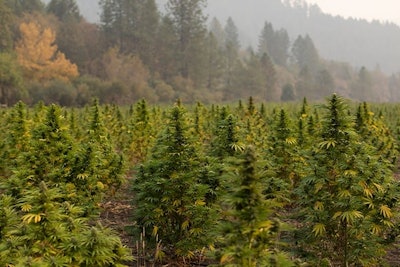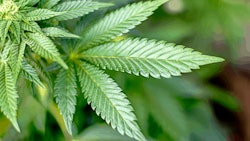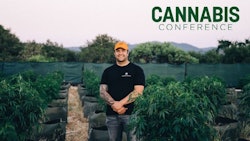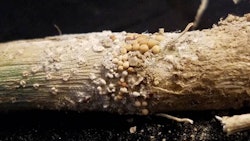
Agents from the Oregon Department of Agriculture (ODA) will visit hemp fields across the state this summer to determine whether the operations are legitimate, and Mason Walker, CEO of East Fork Cultivars, said this is just one component of what he calls a “very large, sweeping bill” that contains several regulatory changes for Oregon’s cannabis and hemp farmers.
Following Gov. Kate Brown’s signing of House Bill 3000, the Oregon Liquor Control Commission (OLCC) held a special meeting July 19 to approve temporary rules that allow the agency to work with the ODA to begin field testing of the state’s registered hemp farms to determine, based on the plants’ tetrahydrocannabinol (THC) content, whether the farmers are growing legitimate hemp or illicit cannabis disguised as hemp.
The OLCC’s temporary regulations create methods for testing hemp in the field to determine whether it is truly hemp (which contains no more than 0.3% THC), as well as establish a limit on the level of THC that can be in hemp-derived products.
Hemp farmers can sometimes unintentionally grow “hot hemp” that tests just above the 0.3% THC threshold, but the OLCC is not focusing its efforts on those operators who have good intentions.
“Unfortunately, in Southern Oregon in particular—this is going to sound bombastic—but there’s been a massive amount of cartel activity this year, more so than probably ever in our history,” Walker told Hemp Grower. Walker’s company, East Fork Cultivars, grows both cannabis and hemp in Josephine County. “Almost overnight this year, there’s been a popup of cultivation operations that are not state-licensed for adult-use cannabis, and may or may not be licensed to grow hemp, but are largely believed to not actually be growing hemp.”
Last week, the OLCC and ODA began inspecting state-licensed hemp operations in Southern Oregon with field testing units.
“We’re really not trying to define what hemp is here: we’re really trying to spot check and take a minimum amount of samples to figure out what is commercial marijuana,” said OLCC Executive Director Steve Marks, in a public statement. “This will enable ODA or law enforcement to stop the illegal production of marijuana disguised as hemp production.”
Walker, who has a seat on the rules advisory committee with the ODA to help guide the rulemaking process, said the ODA will start its field inspections in Jackson, Josephine and Douglas counties, which house a significant portion of the state’s sun-grown cannabis and hemp operations.
The THC testing conducted during these inspections is in addition to farmers’ normally scheduled, pre-harvest testing, Walker said, and will be more on the regulator’s terms.
“Pre-harvest testing happens at a date kind of pre-determined by the farmer, so this will be the regulator driving the timeline here,” he said.
In order to accommodate well-meaning hemp farmers who have perhaps planted less-than-stable genetics, Walker said regulators will not take punitive action against growers unless their crop tests above 5% THC.
Although law enforcement agencies and task forces have been identifying and prosecuting illegal cannabis growers in Southern Oregon for some time now, the emergency rules authorizing hemp field inspections were needed, Walker said, to verify the legitimacy of the state’s hemp operations.
“If you’re participating in a regulated industry and then all of a sudden law enforcement pops in, it’s not great, so this was just taking a regulated approach to inspect these licensed farms under the belief that some of these licensed farms paid the $1,300 fee with the Department of Agriculture to get the agriculture license and they’re using that to grow illicit cannabis,” he said.
The rules advisory committee will meet for the first time on July 29 to provide input on the rulemaking process for the final regulations to implement H.B. 3000, and Walker said his comments will focus on making sure regulators respect the good actors in Oregon’s hemp industry.
“Luckily, our regulators are actually in that same mindset,” he said. “They understand that good actors are really necessary to disincentivize the bad actors.”
As a hemp farmer himself, Walker said he hopes regulators use high-quality testing equipment during the field inspections to ensure accurate results.
“We’re plant breeders, and we have trial plots of our new hemp lines in our fields,” he said. “We try to segregate those very carefully compared with our production fields, in case they do test hot and we have to destroy them. For instance, last year we had to destroy about five rows of plants from our breeding program because they did test hot. They just weren’t stable enough yet. So, my worry is that if that testing equipment is not fine-tuned or nuanced enough, plant breeders in particular could be really close to that line even though they’re acting within good faith.”
Overall, though, Walker said growers using seed from reputable providers should have nothing to worry about.
“What they’re really looking for is the criminal action level, which is above 5 percent [THC],” he said. “If there is an unlucky sampling of a hot plant among not-hot plants, I believe there’s an appeal process on the spot where you can have a chance to show that you’re not a bad actor. So, I don’t think it’s going to be as severe as it maybe could be.”
Regulating Delta-8
H.B. 3000 also closes a loophole that allowed minors to purchase products containing delta-8 THC outside of Oregon’s regulated adult-use cannabis market, in places such as grocery and convenience stores. Now, under the temporary rules, only adults 21 and older with proper identification will be able to purchase products containing “intoxicating components,” including delta-8 and delta-10.
“We’ve not been participating in the delta-8 craze because it just feels outside the spirit of the hemp industry,” Walker said. “Part of the house bill was to address delta-8 being able to be sold as a hemp derivative without any age restrictions, even though it’s intoxicating.”
East Fork has long advocated for rules requiring THC test results on the labels of hemp-derived products in Oregon and has included THC content on its products voluntarily.
“That hasn’t been a requirement in Oregon, and it looks like it will be now as a result of this bill,” Walker said. “That will be part of the rulemaking, to decide how that infrastructure gets put in place. I think that will actually have a bigger far-reaching impact on the hemp industry in Oregon, … with new requirements around THC labeling and THC limits in hemp-derived consumer packaged goods.”
The temporary rules stemming from H.B. 3000 will expire in January 2022, when the OLCC, ODA and the Oregon Health Authority (OHA) will adopt their final regulations.
“I think part of the motivation here, aside from just projecting health in children, is Oregon felt a little pressure to align its rules with USDA, Farm Bill-derived rules,” Walker said. “Oregon has long been operating under the 2014 Farm Bill Pilot Program, and we got exemptions to operate under that program for several years. Whereas most states have moved to align their rules with the 2018 Farm Bill, we just kept getting these exemptions, so we’re just kicking the can down the road as a state. Another part of this bill was to catch up and make our rules in line with federal rules, and it’s actually a good thing, even if it’s going to be a little bit disruptive.”
“I’m hopeful that it will be good policy, and it’s going to be an interesting summer to watch … hemp farms get inspected because there are definitely some folks out there that will fail that test,” Walker added. “It’ll be interesting to see what that results in, whether it results in lawsuits or arrets—I’m not really sure. It will be interesting."























